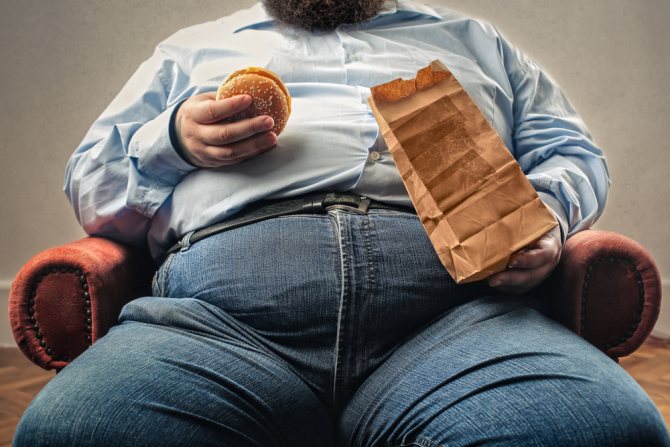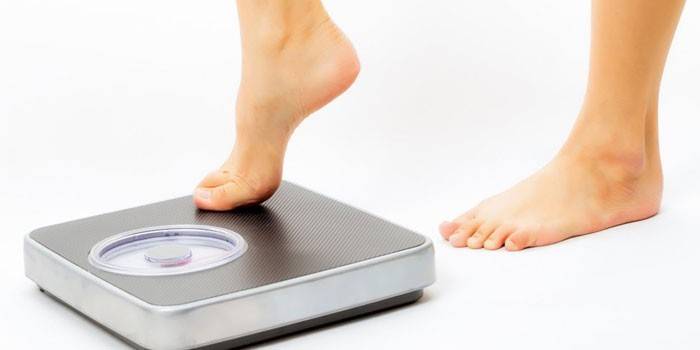30.07.2019 00:00
3367
Excess weight is a problem that almost every person faces in the era of physical inactivity and the Internet. Of course, there are many ways and techniques for weight loss, but not all of them can have a long-lasting effect.
Excess weight is a problem that almost every person faces in the era of physical inactivity and the Internet. Of course, there are many ways and techniques for weight loss, but not all of them can have a long-lasting effect. Most often, after some kind of diet or taking diet pills, a person, returning to the normal rhythm of life, regains the previous kilograms. At the same time, weight gain occurs quickly and for some reason the hated fat becomes much larger. This is all due to an unbalanced diet and typical mistakes that people make when deciding to lose weight at any cost.
Why can't I lose weight?
The reasons may vary. For example, an attempt to lose excess weight through a strict diet can lead to the body deciding that “hunger times” have come and starting to “stock up.” When planning a diet, it is important to take into account a number of factors: not only the quantity of calories consumed, but also their quality, the regularity of meals, the distribution of calorie content throughout the day, and much more. But the main thing is to understand the main task: you need to change your eating habits, and not muster your will for a limited period of time, and then return to your usual diet. The same is true for physical activity: regular moderate exercise sets will have a better effect in the long term than rare trips to the gym for grueling workouts. Another possible reason for failure in the fight against excess weight may be an incorrectly chosen “battlefield”: weight gain can often be triggered not only and not so much by overeating and lack of physical activity, but by the body’s natural hormonal response to stress. In the modern world, chronic stress has become the norm of life, while the human body has remained virtually unchanged evolutionarily. Physiological responses to stress did not change either. To survive in a stressful situation, you need energy; its production and accumulation are regulated by certain hormones produced in the body. In addition to the increased production of stress hormones, other hormonal imbalances can also lead to difficulties in losing excess weight.
Maybe you just lack motivation?
It seems to you that you are doing everything right: you stick to the diet for a week and train a couple of times on weekdays. But then the weekend comes and you indulge in a mountain of cookies and a huge pizza.
What's the problem? Most likely, due to incorrect and insufficient motivation.

Lack of determination? Maybe the reason for losing weight every day does not seem so important? Fine. Now just imagine yourself in a couple of years with the same lifestyle as you lead now. First you torture your body with fasting, and then you indulge in a lot of tasty treats. You delay the introduction of the diet, do not take vitamins, do not exercise and move little.
Close your eyes and imagine what you will become in a month, two, a year, five years? What will you look like? Your wardrobe will be small and you will have to buy a new one. New wardrobe in stores for big women. The muscle relief will be hidden by a huge layer of fat. The cheekbones will not be visible behind the cheeks, and the neck and face will merge into a double chin. You will no longer be able to walk quickly, let alone run. On the subway or minibus, you will be uncomfortable and ashamed that you are taking up so much space. Deodorants will no longer help you because you will start to sweat a lot and you will smell unpleasant. The majority of passers-by will look at you with contempt and disgust. Those who are kinder - with pity. Just close your eyes and imagine it. Draw a picture. Stand in front of the mirror, try on this image where you are one, two, three, five sizes larger. How do you like this prospect? If this does not touch or scare you, then exaggerate it all to the maximum exactly to the extent that you feel ashamed, scared and disgusted. And then, when you have a desire to eat an extra piece of cake or a pack of chips before going to bed, remember this, try it on yourself. Most likely, the desire for an absolutely unnecessary snack will disappear completely!

How to understand that the cause of excess weight is hormones?
If you consistently adhere to a balanced diet and regularly exercise, but the excess weight still does not go away or goes away extremely slowly, first of all you need to exclude diseases that can provoke hormonal imbalances: diabetes mellitus, hypothyroidism (low thyroid function), polycystic ovary syndrome in women, etc. In women, excess weight can also be caused by the onset of menopause and, as a consequence, a decrease in the production of ovarian hormones: estrogens. To do this, you need to consult an endocrinologist or gynecologist and undergo the appropriate tests.
Often, excess weight gain is triggered by excess production of the main stress hormone: cortisol. To determine its level, you can take a number of tests, but, unfortunately, they are not always informative, since the amount of cortisol in the blood changes throughout the day. At the same time, there is a set of external signs by which it is quite easy to determine that it was cortisol that caused excess weight. In particular, these are fat deposits in the abdominal area and their absence on the arms and legs (moreover, the arms and legs may even look too thin), a moon-shaped face (fat deposits are located on the chin), stretch marks and loose skin.
The cause of cortisol obesity may be Cushing's syndrome. This is a serious disease caused by damage to the hypothalamus and/or pituitary gland or tumor formations in the adrenal cortex. But cortisol excess weight can also be caused by a completely everyday reason, a lifestyle associated with a high level of stress.
How to eat and lose weight?
Now that it has become clear why weight does not come off with proper nutrition, you just need to organize a training regimen, drink enough fluids and eat frequently, moderately and rationally.
In the last point, ]Grow Food[/anchor] is a very good assistant, which is ready to provide a choice of 9 balanced diet options for different activity levels and goals. The menu suggests the possibility of eating up to 5 times a day, each optimally balanced in terms of the ratio of proteins, fats and carbohydrates.
You just need to choose the appropriate menu, and two or three times a week, ready-made, weighed and packaged GrowFood meals will be delivered, which will help you stay in shape deliciously and without wasting time.
Where does excess cortisol come from?
Let's understand the mechanism of cortisol production in our body. Cortisol is one of the hormones produced by the adrenal cortex. This is the main stress hormone, it increases blood sugar levels, improves the brain's use of glucose and increases the availability of substances that repair tissue. Cortisol is produced in the body constantly, most of it enters the blood in the morning to provide the body with energy to wake up, then the amount of the hormone gradually decreases throughout the day, except in situations that the body perceives as danger. When faced with a threat, an alarm signal appears in the cerebral cortex, which goes to the hypothalamus. The hypothalamus secretes a hormone that acts on the pituitary gland. And the pituitary gland, in turn, triggers the adrenal glands to produce and release cortisol and adrenaline into the blood. Adrenaline increases your heart rate, blood pressure and energy expenditure, while cortisol supplies this energy by releasing glucose into the blood. This is where the main problem lies: cortisol produces glucose by breaking down fats, and in their absence, proteins from muscles. If there are too many stressful situations, cortisol levels remain at a consistently high level, and increased production of glucose continues, which, in the absence of a real need for it, forms fat deposits. Moreover, in addition to excess weight, persistently elevated cortisol levels can lead to a number of other unpleasant consequences: the risk of developing atherosclerosis, malfunction of the adrenal glands, brittle bones, constant weakness, and depression.
Don't skip breakfast
Refusal of breakfast and lack of appetite in the morning are already symptoms of a metabolic disorder. Many physical processes are subject to daily biorhythms and gastric juice is produced in the stomach, regardless of actual food intake. In the morning, the whole body is in anticipation of breakfast and depends on the food it receives when bile begins to be produced in the intestines.

So how to deal with excess weight caused by stress?
The main recommendation for reducing cortisol excess weight is to reduce anxiety levels. Working with a psychologist or independently analyzing the causes of chronic stress can help with this: you need to identify situations that make you feel stressed and try to avoid them or reconsider your attitude towards them. But with sports you need to be extremely careful. Attempts to reduce excess weight through active physical exercise can lead to the opposite effect, since, exhausting your body, you will again fall into a state of anxiety. Also, strength training itself is stressful for the body, so it only increases cortisol levels. However, physical activity that helps you relax will make a positive difference. This could be regular walks in the fresh air, yoga classes, swimming. Also, we must not forget that, in addition to the stress hormone, our body also produces hormones of happiness, satisfaction, pleasure: dopamine, serotonin, oxytocin and endorphin. At a chemical level, they help prevent excess cortisol production or break down excess cortisol. Therefore, you need to try to compensate for stressful situations that arise with something pleasant: communication with loved ones, awareness of your own achievements, a feeling of joy from victories, laughter from the heart, etc.
Second reason: sedentary lifestyle
If you sit in the office at the computer all day (or at home in front of the TV), then even despite regularly visiting the gym, your lifestyle is considered sedentary. This is why the body spends little energy and fat reserves remain in place
What to do?
To lose weight, 2-3 workouts a week is not enough if you sit for 6-8 hours a day. Make other efforts to rev up your metabolism. For example, walk outside every day, avoid the elevator and escalator. In the office, try not to sit still all working day - get up more often, go to your colleagues in another department instead of talking with them using instant messenger or phone. Limit the time in front of TV or try to do simple exercises while watching it - spin a hoop, do a “bicycle”, etc.
Maybe take some sedatives?
Of course, taking sedatives can have a situational effect and temporarily reduce cortisol production to normal. But you can’t take sedatives on a regular basis, they will simply stop working. If you want to support your nervous system, it is better to take vitamin complexes with an emphasis on vitamins B and D. This is a non-specific remedy, so it will not necessarily directly affect the level of cortisol production, but it will increase the chance of stabilizing emotional reactions and anxiety states.
Are there other ways to somehow help the body?
The constant production of large amounts of cortisol is an unnatural state of the body, therefore, along with working to reduce the number of factors that provoke an increased release of this hormone into the blood, the right solution would be to support the work of the organ that produces it: the adrenal glands. For the human body to respond adequately to stress, it is necessary for the adrenal glands to function properly. This is why it is possible and necessary to help the adrenal glands before the consequences of consistently high cortisol production occur. This can be done by supporting the natural self-healing processes that occur in our body, with the help of peptides, substances that regulate the condition of the body's cells and ensure the normal functioning of all organs and tissues. For this purpose, cytamines - complexes of regulatory peptides obtained naturally from animal organs and tissues, which also include the physiologically optimal diet for the corresponding organ in an easily digestible form. In case of potential development of adrenal pathology, cytamine, a natural regulator of intracellular processes responsible for metabolism, can be additionally used. This is, for example, "Suprenamin" . It is a complex of proteins and nucleoproteins that have a selective effect on adrenal cells, which can help restore their functional and organic properties.
Dietary supplement NOT A MEDICINE
As an advertisement
What is the plateau effect
To answer the question why weight does not decrease when playing sports, it is necessary to consider the so-called. plateau effect in training. It refers to the period when body weight stops decreasing during weight loss. This effect is justified by the fact that the human body, which initially actively burned fat, stops doing this, having adapted to the changed diet and load. In other words, you went on a diet and started working out in the fitness room, as a result of this, the weight began to gradually decrease, but in the end you reached the point where the arrows on the bathroom scale simply froze.
Reasons for stopping weight when losing weight
Losing body weight and reducing energy expenditure are two interrelated parameters. If the weight doesn't come off, then one of the problems is that when you go to the gym, you use the same exercises without increasing the intensity or load of the training. If you want to achieve an ideal body, then start training in a variety of ways, increasing the load from time to time, otherwise your body will simply adapt, as a result of which the volume of muscle mass will stop growing and your body weight will stop at the same mark, plus or minus a couple of kilograms.
Another common reason for the problem described is that you violated your diet, for example, you couldn’t resist and ate a bar of chocolate. Another reason is rapid weight loss in the first weeks of dieting and exercise. The fact is that, in addition to fat, you also lost muscle tissue. If muscles decrease, then energy expenditure will decrease. This is very bad for those who are trying hard to achieve an ideal body, because... In order to return the muscles to their previous volumes, you will have to play sports for a very long time.












